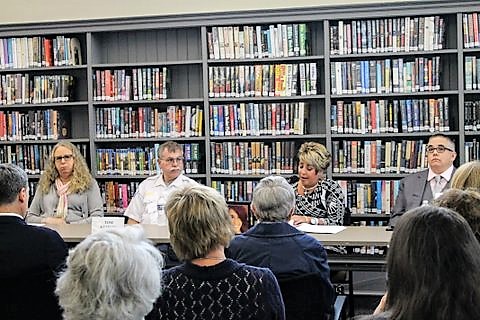Submitted by
Nathaniel A. Thomas, MLS,
Head of Reference, Reading Public Library
On Sept. 18, 2017, the Reading Public Library hosted an interactive panel discussion around the opioid epidemic. In a roomful of more 40 people, state officials, advocates, emergency management personnel and librarians talked about how this epidemic has touched their daily lives and informed their efforts. Below is a brief synopsis of the 90-minute panel. Speakers included: Dr. Rachel Levine, Acting Secretary of Health and state Physician General; Tom Kemery, a registered nurse and paramedic with the City of Reading; Ms. Wendy Loranzo, an advocate for families who find themselves in the grip of opioid addiction; and Nathaniel Thomas, Reading Public Library’s Head of Reference.
Dr. Rachel Levine opened the discussion with addressing how the opioid crisis first began, when in the 1990s federal and state regulations governing the prescription of such drugs for pain management were relaxed. She discussed instances where patients who’d been using prescribed medications such as morphine began seeking that same high elsewhere once the prescriptions expired. Pennsylvania has access to relatively cheap heroin and fentanyl, the latter drug exponentially more potent than morphine itself. The confluence of these factors led to the perfect storm of what has become a true health and social epidemic.
Dr. Levine also spoke to the various initiatives underway at the state level. She specifically noted the newly created Centers of Excellence and their efforts to ensure that people with opioid-related substance issues can stay in treatment, receive follow-up care and support in their communities. (More information about the centers can be found at http://www.dhs.pa.gov/citizens/substanceabuseservices/centersofexcellence/.)
Tom Kemery, local Emergency Management Technician (EMT), spoke to what he and his colleagues meet every day with opioid overdoses. He and his fellow emergency medical personnel respond to as many as six overdoses a day. Kemery spoke to the vital role of the drug naloxone, which is pivotal in reviving persons experiencing overdose symptoms, with severe overdose situations requiring as many as four doses to revive them. He has seen a marked spike in calls to answer opioid overdoses in the city of Reading, adding that when he began his career as an EMT, the most frequent reasons were for motor vehicle accidents, followed by heart attacks and allied conditions. Opioid overdoses have taken over as the number one emergency response.
Wendy Loranzo lost her only child, Elizabeth, to a fatal overdose of heroin in March of this year. Elizabeth, who had undergone rehabilitation treatment for heroin in 2015, appeared to be in a place removed from her addiction. She was developing a clientele for her work as a hair stylist, had a fiancée, and an infant son. Since her daughter’s death, Loranzo has become an advocate, hoping that by sharing her story that she can help to remove the stigma of addiction and that Elizabeth’s struggle helps other families and potentially saves someone’s life.
Nathaniel Thomas stated that his library is no stranger to seeing opioid overdoses. Over the past two years, no fewer than five overdose situations unfolded at the Reading Public Library – one resulting in a fatality. Thomas shared that the Opioid Crisis Panel discussion represented his library’s response to this tragedy, making the argument that their library is an agent for positive change. In its role as a resource center, a community gathering space, and a nexus for information sharing, the Reading Public Library is an affective, counter-epidemic presence in its community. Thomas shared the pride he and his colleagues feel being a part of the work they get to do every day from the library.
Reading Public Library has already looking to host future community conversations at some of their branch locations.


